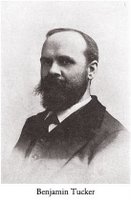
Professor David Levy of George Mason University has pointed out that when Thomas Carlyle labeled economics "the dismal science," he wasn't referring to the pessimistic conclusions drawn by Thomas Malthus. No, what Carlyle found dismal was that market-based societies entail
free labor and rule out
slavery, specifically black slavery. That depressed Carlyle. Perhaps slavery was gone in Britain forever, but now how could whites make sure blacks did the hard work they were destined to do?
In
this Freeman article from 2000, Levy quoted Carlyle's 1849
Fraser's Magazine article, "Occasional Discourse on the Negro Question":
Truly, my philanthropic friends, [anti-slave] Exeter Hall Philanthropy is wonderful; and the Social Science—not a “gay science,” but a rueful [one]—which finds the secret of this universe in “supply-and-demand,” and reduces the duty of human governors to that of letting men alone, is also wonderful. Not a “gay science,” I should say, like some we have heard of; no, a dreary, desolate, and indeed quite abject and distressing one; what we might call, by way of eminence, the dismal science. These two, Exeter Hall Philanthropy and the Dismal Science, led by any sacred cause of Black Emancipation, or the like, to fall in love and make a wedding of it,—will give birth to progenies and prodigies; dark extensive moon-calves, unnameable abortions, wide-coiled monstrosities, such as the world has not seen hitherto!
Levy comments:
Too often soft-pedaled by those who admire his attack on economics, Carlyle was the premier theorist of the idealized slave society. In opposition to the economists’ supply-and-demand model of human society, he put forward the doctrine of obedience to one’s betters. While he had been making such arguments through the 1840s, it wasn’t until the “Negro Question” that he realized that all white people are "better" than all black people. This certainly made the idealized slavery more attractive for white Britons than one in which they might be on the cutting end of the "beneficent whip." . . .Carlyle idealized slavery in the same way economists idealized markets. To match the economists’ claim of mutual gain from exchange, Carlyle put forward the doctrine of the joys of service to one’s betters. And according to the way things were supposed to work, the common religion would give the details of the hierarchy.

Responding anonymously to Carlyle in
Fraser's in 1850 was John Stuart Mill. In
"The Negro Question" Mill objected to Carlyle's religious-based claim that black people were put on earth to work for white people. He wrote: "If 'the gods' will this, it is the first duty of human beings to resist such gods. Omnipotent these 'gods' are
not, for powers which demand
human tyranny and injustice cannot accomplish their purpose unless human beings coöperate. The history of human improvement is the record of a struggle by which inch after inch of ground has been wrung from these maleficent powers, and more and more of human life rescued from the iniquitous dominion of the law of might. Much, very much of this work still remains to do; but the progress made in it is the best and greatest achievement yet performed by mankind, and it was hardly to be expected at this period of the world that we should be enjoined, by way of a great reform in human affair, to begin
undoing it."
Mill went on, passionately, satirically, for 4,600 words, praising the anti-slavery movement as a movement for justice and condemning slavery and the slave trade as criminal. He mocked Carlyle all the way: "That negroes should exist, and enjoy existence, on so little work, is a scandal, in his eyes, worse than their former slavery. It must be put a stop to at any price. He does not 'wish to see' them slaves again 'if it can be avoided ;' but 'decidedly' they 'will have to be servants,’' 'servants to the whites,' ' compelled to labor,' and 'not to go idle another minute.' " Carlyle presented himself as the benefactor of black people and invoked the "divine right of being compelled, if permitted will not serve, to do what work they are appointed for." According to Carlyle, whites had this "right" also. "But," Mill wrote, "he will begin with the blacks, and will make them work
for certain whites, those whites
not working at all; that so 'the eternal purpose and supreme will' may be fulfilled, and 'injustice,' which is 'forever accursed,' may cease."
Mill then turned to "the gospel of work," praised by Carlyle, "which, to my mind, justly deserves the name of a cant." He attacked the idea that work is an end in itself, rather than merely a means. "While we talk only of work, and not of its object, we are far from the root of the matter; or, if it may be called the root, it is a root without flower or fruit. . . .In opposition to the 'gospel of work,' I would assert the gospel of leisure, and maintain that human beings
cannot rise to the finer attributes of their nature compatibly with a life filled with labor . . . the exhausting, stiffening, stupefying toil of many kinds of agricultural and manufacturing laborers. To reduce very greatly the quantity of work required to carry on existence is as needful as to distribute it more equally; and the progress of science, and the increasing ascendancy of justice and good sense, tend to this result."
Levy sums up
If a student knows the Carlyle-Mill debate, it is impossible to think of the classical economists as taking the reactionary side in the Victorian debate over social organization. The alternative to markets was not socialism. There were socialist experiments, but there were no socialist economies. The alternative to market organization was slavery. Teachers have to work rather hard to hide this fact. For instance, when students in classes in British literature encounter Charles Dickens’s 1854 Hard Times, with its savage attack on markets and market economics, teachers wishing to present Dickens as "progressive" have to be careful. When they explain why it is "inscribed to Thomas Carlyle," it is probably helpful to their cause if they not mention that in 1853 Carlyle republished an expanded version of his part of the exchange with Mill under the title Occasional Discourse on the Nigger Question. What would modern students think if they knew that the attack on market transactions came from those who idealized slavery for black people?
The Carlyle-Mill debate was a theoretical debate. Ideas do have consequences. The issues stopped being purely theoretical in what historians call the “Governor Eyre controversy” of mid-1860s Britain. What ought we to do about those responsible for an administrative massacre of nonwhite Jamaicans? On the side demanding colorblind justice we find the old coalition Carlyle opposed, antislave Evangelicals and economists now joined by Charles Darwin and T. H. Huxley. In opposition we find all the major antimarket voices in Victorian literature—Dickens, John Ruskin, Charles Kingsley, and Alfred Tennyson—joining Carlyle in making the case that it could not be murder to kill Jamaicans of color because one could only murder people. The defeat of the Evangelical-economic coalition was complete. Eyre walked; Mill lost his seat in Parliament; the century of administrative massacre began. And the episode is never mentioned when in English classes the stories of the progressive literary figures and the heartless economists are retold.
More by Levy (and Sandra Peart)
here.
Hat tip for the Mill response: Jeff Hummel










